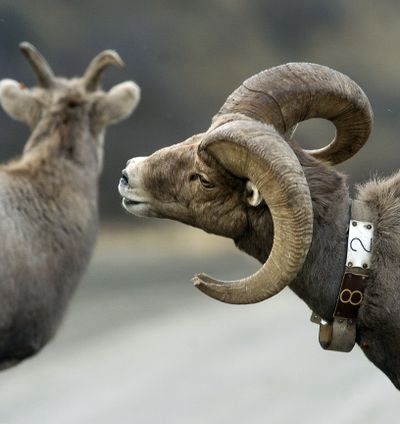Idaho OKs plans protecting bighorns

LEWISTON – The Idaho Department of Fish and Game has approved agreements with 11 sheep producers to prevent domestic sheep from coming in contact with wild bighorn sheep.
Idaho Fish and Game Director Cal Groen signed the agreements Thursday that are intended to protect bighorns from diseases carried by domestic sheep while also keeping domestic sheep producers in business.
“The agreements we’ve reached, without exception, reduce the risk for direct contact between the two species,” said Dale Toweill of Fish and Game.
Biologists have widely concluded that domestic sheep pass diseases to bighorns, causing bighorns to die because they have no natural resistance to the illnesses. But sheep industry officials say they could be put out of business if grazing allotments are closed due to that concern.
Earlier this year, Gov. Butch Otter signed into law a bill to require Fish and Game to work with producers to develop a plan to keep bighorns away from domestic sheep while preserving domestic sheep grazing on federal land.
State officials don’t manage federal land, but they do manage wildlife, including bighorns.
The law calls for Fish and Game to certify as acceptable any risk of disease transfer to bighorns remaining after the plan is put in place.
Fish and Game officials identified 18 producers with 60 grazing allotments whose sheep could come in contact with bighorns. Agreements with 11 have been signed. Toweill said the agency is trying to forge agreements with three more producers but that four others have not responded to the agency.
The agreements cover grazing allotments spanning much of central and southern Idaho. They include allotments in the Lost River Range and Boulder-White Cloud Mountains in central Idaho, and allotments in Twin Falls County in south-central Idaho and Owyhee County in southwest Idaho.
Some sheep producers, Toweill said, have agreed to increase the number of sheep herders and dogs. Some producers also have agreed to equip herders with satellite phones to quickly report possible intermingling of domestic and bighorn sheep.
Fish and Game officials can kill bighorns that stray into allotments and come in contact with domestic sheep. Toweill said some sheep producers have agreed to the killing of domestic sheep that stray out of allotments.
Two sheep producers who have not signed agreements are Ron Shirts of Weiser and Mick Carlson of Riggins.
William Myers, Carlson’s attorney, said Carlson was disappointed Fish and Game rejected Carlson’s plan.
“I’m now working with Mick to put those ideas in writing to send to Fish and Game for another look,” said Myers.
Keith Lawrence, director of the Nez Perce Tribe’s wildlife department, said the tribe believes domestic sheep should be kept out of areas where bighorns are present.
“The root problem is you still have domestic sheep too close to bighorn sheep,” he said. “If you have to have a kill permit to make separation then you are probably way too close.”